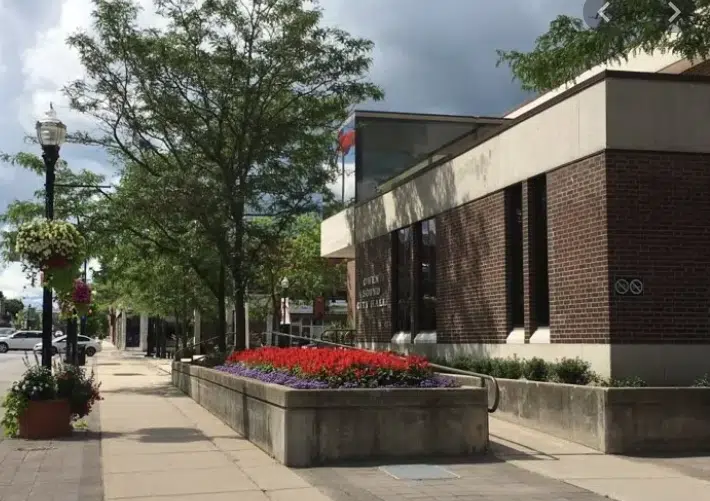
Owen Sound City Hall. (file photo)
Owen Sound city council will wait until 2023 to further explore the implementation of a curbside green bin program, as the annual cost of introducing it now would require the price of a garbage bag tag to more than double to provide adequate revenues to support it.
City council voted at Monday’s meeting to accept recommendations from the Operations Committee to wait until the transition to full producer responsibility of the blue box recycling program and until the current waste management contracts end to further consider implementation of a source separated organics collection program.
Council also directed staff to prepare a waste management strategy that would include a service review of collection programs, blue box recycling, source separated organics collection and revenue generating options based on a full user pay system.
According to a report by Owen Sound’s Supervisor of Environment Services Cassandra Cesco, the cost of a bag tag in Owen Sound would have to increase to $5.85 each to recover the price for both curbside organics and garbage collection.
The current cost of a bag tag is $2.50 each.
Cesco’s report explains the net annual cost to provide a green bin program in Owen Sound would be $400,000 — which equates to a 1.33 per cent tax increase on its own.
Green bin collection, if implemented today, would actually cost the city more than garbage collection does annually. The report reviewed by council Monday explains 2021 bi-weekly garbage collection is estimated to cost around $391,000, while source separated organics would cost over $426,000.
“However, if we were to wait for the implementation of producer responsibility for the bluebox program starting in 2023, the reduced cost to the city in recycling would nearly offset the cost to implement the green bin program,” says Owen Sound city councillor Brock Hamley, who sits on the Operations Committee.
The Ontario government introduced a proposed new blue box regulation in October 2020 to standardize and increase the list of materials accepted in blue boxes, while transitioning costs of the program away from municipal taxpayers by making producers of products and packaging fully responsible for costs.
The change is expected to result in $135-million in annual savings for Ontario municipalities. Some communities are expected to transition to the new framework by Jan. 1, 2023.
“Given the blue box recycling program will become a producer responsibility as early as May 2023 for Owen Sound, the city would have the financial ability at that time to start a curbside organics program will little to no impact on residents,” Cesco’s report explains. “The costs saved from the blue box box transition to producer responsibility would assist in funding the green bin program.”
The report says the net difference in costs for the city between the two programs is approximately $35,000 — or a .12 per cent tax hike. Owen Sound’s net cost for curbside recycling in 2019 was $365,000.
“By freeing up the cost of blue box recycling, we would have money available to help with organic waste or food waste program,” Owen Sound Mayor Ian Boddy says.
Boddy notes it’s too early to say what route the city may pursue, but says it would make sense to continue in some manner with a user fee (garbage bag tags) for the cost of waste management.
“Whether it is food waste, green bin or straight landfill, there is still garbage coming out of houses that we have to be responsible for,” Boddy explains. “And if we can find a better way for the planet and for the environment to do it, that certainly would be our goal.”
Cesco’s report estimates the city’s solid waste landfill diversion rate could reach 68 per cent with the implementation of a curbside source separated organics program. In 2019, Owen Sound’s waste diversion rate was just over 54 per cent. The city sent more than 1,880 tonnes of waste to the landfill.



